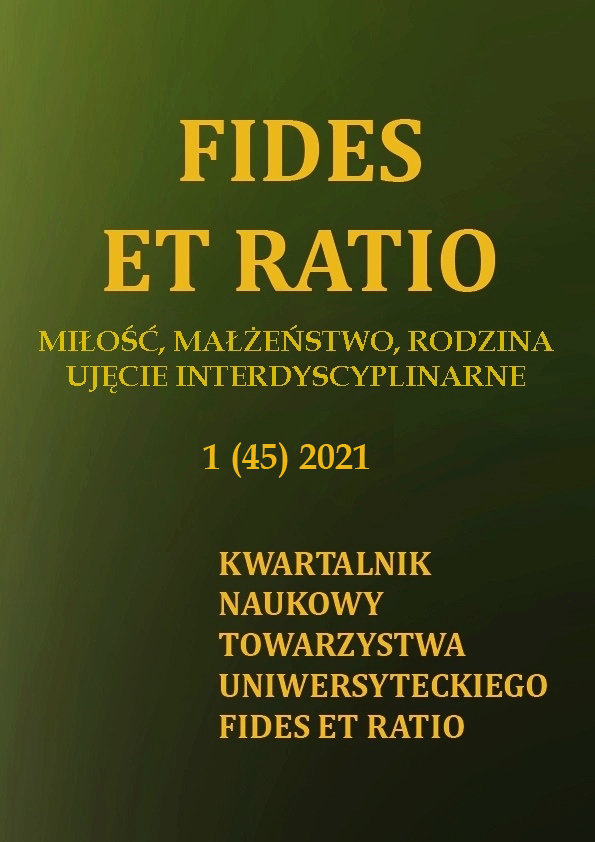Abstract
The motives of the self have been the subject of psychological research for many years, while the concept is relatively new. The presented article contains an empirical verification of the Circumplex Model of Self-Motives based on the personalistic concept of personality proposed by H. Gasiul. The author, based on the results of searching for significant sources of human motivation, justified in his analyzes that the most important motives are those that result from the personal nature of man, and in particular from its attributes. The model of 12 self motives developed by H. Gasiul and W. Strus is the result of taking into account various categories of personal attributes and types of self motives indicated on the basis of various empirical psychological studies. The obtained data largely confirm the accuracy of the circular model of self motives and may also constitute the legitimacy of their hierarchical arrangement.
References
Batory, A. (2018). Motywy tożsamościowe - sposób pomiaru w ujęciu teorii motywowanego konstruowania tożsamości, (w:) H. Gasiul (red.) Metody badania Emocji i Motywacji, 335–348, Warszawa: Difin.
Bycz, H., Konarski, R. (2016). Narzędzie do pomiaru metapoznawczego Ja: MJ-24, Psychologia Społeczna, Wydawnictwo Naukowe Scholar Sp. z o.o., XI (39), 509–526, doi: https://doi.org/10.7366/1896180020163909.
Cieciuch, J. (2013). Kształtowanie się systemu wartości od dzieciństwa do wczesnej dorosłości, Warszawa: Liberi Libri.
Cieciuch, J., Hulak, A., Kitaj, M., Leszczyńska, J., Bulkowska, D. (2011). Kołowa struktura wartości u dzieci przedszkolnych, Studia Psychologica, 11 (11), 5–18.
Fanslau, A. i Brycz, H. (2019). Rola metapoznawczego Ja w poszukiwaniu diagnostycznych informacji o sobie, Czasopismo Psychologiczne, 2 (25), doi: https://doi.org/10.14691/CPPJ.25.2.151.
Gasiul, H. (2007). Teorie Emocji i Motywacji, Warszawa: UKSW.
Gasiul, H. (2012). Czy powrót do psychologii personalistycznej jest możliwy i jak mógłby być uzasadniony?, Czasopismo Psychologiczne, 2 (18), 1–14.
Gasiul, H. (2013). Poczucie szczęścia a dojrzałość człowieka, Horyzonty Psychologii, 3, 53–70.
Gasiul, H. (2016). Podmiotowość z perspektywy wybranych teorii psychologicznych, Psychologia Rozwojowa, 3 (21), 9–24, doi: https://doi.org/10.4467/20843879PR.16.013.5524.
Gasiul, H. (2020). Psychologia osobowości. Nurty, teorie, koncepcje, Warszawa: Difin.
Gasiul, H, Strus, W. (2018). Wybrane sposoby pomiaru motywów Ja, (w:) H. Gasiul (red.) Metody badania Emocji i Motywacji, 349–388, Warszawa: Difin.
Jędruszczak, K. (2005). Prywatność jako potrzeba w ramach koncepcji siebie, Roczniki Psychologiczne, 2 (8), 111–135.
Mair, P., Groenen, P.J.F. i De Leeuw, J. (2021). More on Multidimensional Scaling and Unfolding in R: smacof Version 2, za: https://cran.r-project.org/web/packages/smacof/vignettes/smacof.pdf (dostęp: 15.12.2020).
Pankalla, A. i Kilian, A. (2018). Re-wizja i re-autoryzacja psychologii. Ekspedycja na peryferie-od myśli krytycznej ku psychologii realnej, Psychological Journal, 24, 21–35, doi: https://doi.org/10.14691/CPPJ.24.1.21.
Schwartz, S.H. (1992). Universals in the content and structure of values: Theory and empirical tests in 20 countries, (in:) M. Zanna (ed.) Advances in experimental social psychology, 1–65, New York: Academic Press.
Schwartz, S.H. i Bardi, A. (2001). Value hierarchies across cultures: Taking a similarities perspective, Journal of Cross-Cultural Psychology. SAGE Publications Inc., 3 (32), 268–290, doi: https://doi.org/10.1177/0022022101032003002.
Schwartz, S.H., Cieciuch, J., Vecchione, M., Davidov, E., Fischer, R., Beierlein, C., Ramos, A., Verkasalo, M., Lönnqvist, J.E., Demirutku, K., Dirilen-Gumus, O. i Konty, M. (2012). Refining the theory of basic individual values, Journal of Personality and Social Psychology, 4 (103), 663–688, doi: https://doi.org/10.1037/a0029393.
Spence, I., Ogilvie, J.C. (1973). A table of expected stress values for random rankings in nonmetric multidimensional scaling, Multivariate Behavioral Research, 4 (84), 511–517, doi: https://doi.org/10.1207/s15327906mbr0804_8.
Straś-Romanowska, M. (1995). Główne idee teoretyczne i metodologiczne psychologii personalistyczno-egzystencjalnej jako dyscypliny humanistycznej, (w:) M. Straś-Romanowska (red.), Na tropach psychologii jako nauki humanistycznej, 15–47, Warszawa: Wydawnictwo Naukowe PWN.
Strus, W., Cieciuch, J. (2017). Towards a synthesis of personality, temperament, motivation, emotion and mental health models within the Circumplex of Personality Metatraits, Journal of Research in Personality, 66, 70–95, doi: https://doi.org/https://doi.org/10.1016/j.jrp.2016.12.002.
Strus, W., Cieciuch, J., Rowiński, T. (2014). The circumplex of personality metatraits: A synthesizing model of personality based on the Big Five, Review of General Psychology, 4 (18), 273–286, doi: https://doi.org/10.1037/gpr0000017.
Tesser, A., Felson, R.B., Suls, J.M. (2004). Ja i tożsamość, Gdańsk: Gdańskie Wydawnictwo Psychologiczne.
Wojciszke, B. (2004). Człowiek wśród ludzi: zarys psychologii społecznej, Warszawa: Wydawnictwo Naukowe Scholar.
